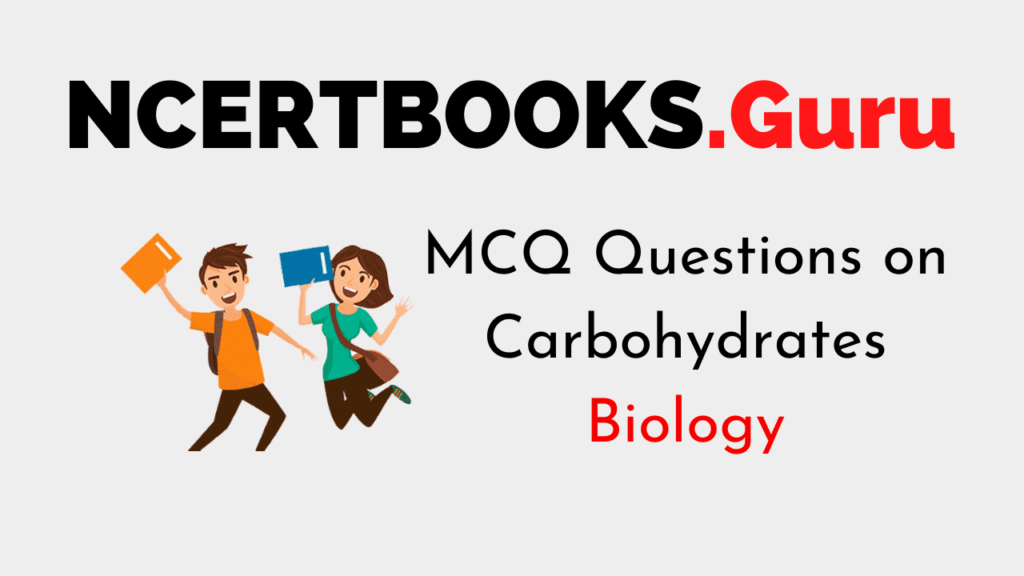Biology is the study of life. Below, You will find a list of Biology MCQ Questions as per the latest prescribed syllabus. Ace up your preparation with the Objective Questions available on Carbohydrates and enhance your subject knowledge. Understand the concept clearly by consistently practicing the Multiple Choice Questions and score well in your exams.
MCQ Questions on Carbohydrates
1. Which of the following Biomolecules simply refers to as “Staff of life”?
(a) Lipids
(b) Proteins
(c) Vitamins
(d) Carbohydrates
Answer
Answer: (d) Carbohydrates.
2. Which of the following is the simplest form of carbohydrates?
(a) Carboxyl groups
(b) Aldehyde and Ketone groups
(c) Alcohol and Carboxyl groups
(d) Hydroxyl groups and Hydrogen groups
Answer
Answer: (b) Aldehyde and Ketone groups.
3. Which of the following monosaccharides is the majority found in the human body?
(a) D-type
(b) L-type
(c) LD-types
(d) None of the above
Answer
Answer: (a) D-type.
4. Which of the following is the most abundant biomolecule on the earth?
(a) Lipids
(b) Proteins
(c) Carbohydrates
(d) Nucleic acids.
Answer
Answer: (c) Carbohydrates.
5. Which of the following are the major functions of Carbohydrates?
(a) Storage
(b) Structural framework
(c) Transport Materials
(d) Both Storage and structural framework
Answer
Answer: (d) Both Storage and structural framework.
6. Which of the following is the general formula of Carbohydrates?
(a) (C4H2O)n
(b) (C6H2O)n
(c) (CH2O)n
(d) (C2H2O)n COOH
Answer
Answer: (c) (CH2O)n.
7. Which of the following is the smallest carbohydrate – triose?
(a) Ribose
(b) Glucose
(c) Glyceraldehyde
(d) Dihydroxyacetone
Answer
Answer: (c) Glyceraldehyde.
8. Which of the following is a reducing sugar?
(a) Dihydroxyacetone
(b) Erythrulose
(c) Glucose
(d) All of the above
Answer
Answer: (c) Glucose.
9. Which of the following is an example of Epimers?
(a) Glucose and Ribose
(b) Glucose and Galactose
(c) Galactose, Mannose and Glucose
(d) Glucose, Ribose and Mannose
Answer
Answer: (b) Glucose and Galactose
10. Which of the following has reducing properties?
(a) Mucic acid
(b) Glucaric acid
(c) Gluconic acid
(d) Glucuronic acid
Answer
Answer: (d) Glucuronic acid.
11. Molisch test is used for _________.
(a) Lipids
(b) Proteins
(c) Mucoproteins
(d) Flavoproteins
Answer
Answer: (c) Mucoproteins.
12. What is Turanose?
(a) 7-methyl sugar
(b) A deoxy sugars
(c) Non reducing disaccharide
(d) Reducing disaccharides of glucose and fructose
Answer
Answer: (d) Reducing disaccharides of glucose and fructose
13. Which of the following does not have sulphuric acid groups?
(a) Heparin
(b) Kerato sulfate
(c) Hyaluronic acid
(d) Chondroitin sulfate
Answer
Answer: (c) Hyaluronic acid.
14. Digitonin is a _________.
(a) Lipid
(b) Protein
(c) Glycoside
(d) Alkaloid
Answer
Answer: (c) Glycoside.
15. Which of the following is the simplest carbohydrate?
(a) Gulose
(b) Glucose
(c) Dihydroxyacetone
(d) Glyceraldehyde
Answer
Answer: (d) Glyceraldehyde.
